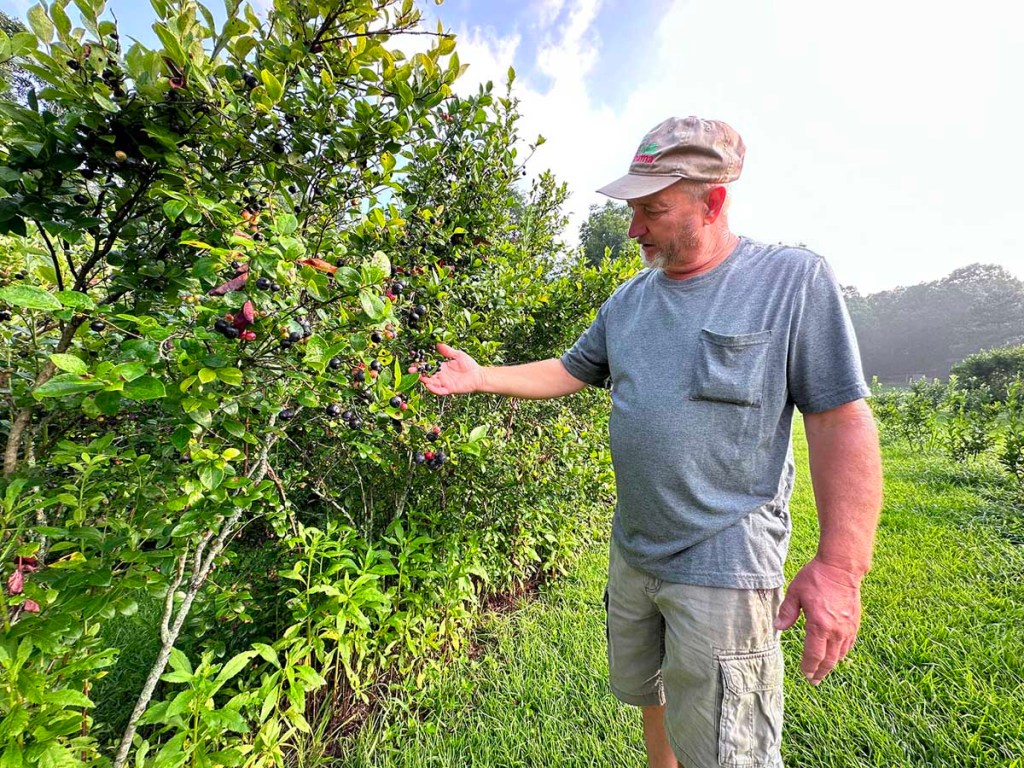Manage now for next year’s blueberries
Published 8:41 am Thursday, August 1, 2024

- Darrell Bagwell picks a few blueberries at his farm in Cullman County in July 2023. Amanda Shavers, For The News-Aegis
As summer continues to sizzle, blueberry season is fizzling out in Alabama. Most blueberries in central Alabama hit peak production near July 4, then berry production begins to decline. Mallory Kelley, an Alabama Cooperative Extension System home grounds, gardens and home pests regional agent, said maintenance now will ensure a healthy blueberry crop next year.
“The most important thing you can do any time of year for a blueberry bush is water and control weeds,” Kelley said. “Now that the plants are finished making berries, the plants will begin to put their energy toward making new shoots and branches.”
Trending
Kelley said this is exactly what a grower wants, as new growth will hold the biggest and best berries next year. To promote branch growth, plants will need water, mulch and fertilizer. Avoid fertilizing after mid-September to minimize new tissue’s susceptibility to frost damage.
Fertilizing and Pruning
“Generally, blueberries need fertilizing twice per year: once in early spring and again as berries fade away,” Kelley said.
Use a urea-based fertilizer labeled for azaleas and camellias. This fertilizer will help acidify the soil, as blueberries like a low pH of 4.5 to 5.2. Growers should also submit soil samples for testing if they have not tested the soil in the previous three years. This will confirm soil nutrient levels and determine soil pH.
Kelley said pruning blueberry bushes now will multiply berry production next year.
“As your plants start to grow long, straight shoots and canes, clip these a little lower than where you would like to have the fruit next year,” she said. “This means if you want the fruit to be chest high, clip those canes about a foot lower.”
More clipping on long canes will mean more branching on the bush. More branches will mean more fruit on those branches next year. Take care to remove any dead or diseased branches while pruning.
Planting
The fall is a great time to plant more blueberries. Different varieties produce at different times throughout the summer. So, Kelley recommends planting different varieties of rabbiteye blueberries to prolong the growing season.
Growers should plant blueberries in an area that receives full sun and has moist, well-aerated and well-drained soil that is high in organic matter. You can incorporate organic matter in the form of peat moss, compost or fine pine bark. Additional organic matter will help the soil retain water, as well as suppress weeds.
More Information
For more information about growth and maintenance of blueberries, call the Master Gardener Helpline. The toll-free helpline connects callers with a knowledgeable team of Master Gardener volunteers who can help answer all of your gardening questions. Armed with research and Alabama Extension publications, these volunteers can also contact Extension specialists to find the answers you need. Call 1-877-ALA-GROW (252-4769) to reach the Master Gardener Helpline.


